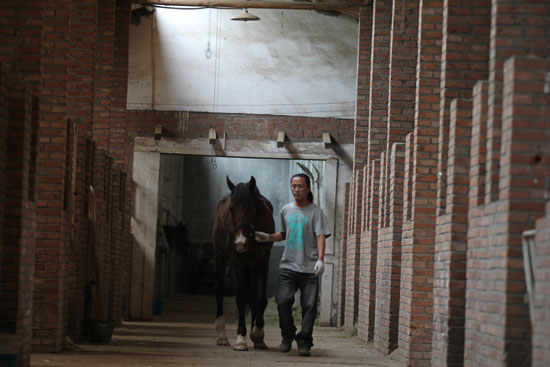Focus
Number of riding schools grow at a canter, despite losses
By Liu Lu (China Daily)
Updated: 2010-06-03 07:50
 |
Large Medium Small |
|
 Despite its growing popularity, most of Beijing's riding clubs operate in a loss. WANG JING / CHINA DAILY |
Equestrianism - the art of horse riding - is no longer novel in China's capital, which now boasts about 60 riding clubs that attract thousands of enthusiasts wanting to saddle up.
Equestrianism specifically refers to the skill of riding or driving horses and is the only event at the Olympic Games that involves a partnership between man and animal.
The sport has long been thought of as a noble one reflecting its practitioners' identity and social status but, with the rise in living standard and people's change in attitude toward the sport, equestrianism is more affordable and more trendy than it has ever been in Beijing.
However, despite its growing popularity, most of the city's riding clubs are not yet turning a profit.
"Most operators in the city are just motivated to run a riding club because of their passion for the sport and not because they are driven by money," said Li Ning, the CEO of the official website of the China Equestrian Association and owner of the Yingchen International Horse-riding Club, which is located in Shunyi district in Beijing's suburban northeast.
"But with people entering the industry nowadays understanding better about how to run a profitable club, the industry is becoming more standardized."
Li's club is one of the few that turns a profit. It has more than 400 members, and the number is growing.
Like most of the city's riding club owners, Li is also an enthusiastic student, improving his saddle skills whenever possible.
Before he set up his club in the middle of 2008, Li worked in the information technology industry. He said he lost confidence in the sector's prospects and decided the time was ripe for a career change.
"I went to Europe to learn from equestrian clubs there," he said. "In addition, I also extensively market my club. I have a professional marketing team working for me. All this contributes to my club's success."
He said the horse riding industry is largely a seasonal one, with cold days putting many clubs in the red.
"Winter is the off-season for the sport because the cold weather keeps people at home and the stable has to spend more on heating."
Despite the challenges for equestrian clubs, the sport is taking off locally. Beijing now has 80 percent of the nation's horse riders.
However, despite its growing popularity, the sport still lags far behind traditional favorites of wealthy participants, such as golf, billiards and tennis.
Despite having a reputation for being a sport for the well-to-do, it is a lot more affordable in China than in developed countries.
Lovers of the sport say it can even fit into the pocket book of white-collar workers and is perfect for families to enjoy together.
Most riding clubs in Beijing have a membership systems and charge anything from 2,800 to 30,000 yuan a year.
In addition to the annual fees, all clubs require their members to pay additional horse-raising fees.
Members fall into two groups: Those who have their own horses and those who hire a horse.
The clubs provides accommodation for horses for between 1,500 yuan and 3,000 yuan a month. Members who do not own a horse are asked to pay a monthly feeding fee for the rental horses of around 2,500 yuan.
Zhao Yanbo, a professional equestrian coach with four years of teaching experience at Beijing Ai Ma Shi Equestrianism Club in Shunyi district, told METRO half of his students were expats living in Beijing.
"I prefer foreign students to Chinese because they are more likely to persevere and be patient learners," Zhao said. "What's more important is they are more willing to communicate with the horses, which is vital if you want to master this particular sport."
He said Chinese students are prone to give up when they find the sport is not as easy as they were expecting.
Zhao said the number of members in his club has been rising.
"I had only four or five students back in 2006 but now I have more than a dozen," he said.
Zhao said regular horse riding is beneficial to the heath because it can not only improve the rider's agility and physical coordination but strengthen muscles - especially in the leg.
Most equestrian clubs in the city use both domestic and imported horses, said Li.
"Sixty percent of horses in my club, the Yingchen International Horse-riding Club, are retired racehorses from Hong Kong and Macao," said Li.
"Although they are no longer fit to take part in competitive sports, they are good enough for ordinary people to learn riding skills. The rest of the horses in service are purebred domestic horses."
But there is a note of caution for the growing sport, Li predicted that the number of equestrian clubs in Beijing will decrease because the government has said it plans to buy back land leased to stable owners because the land is now needed for commercial development.